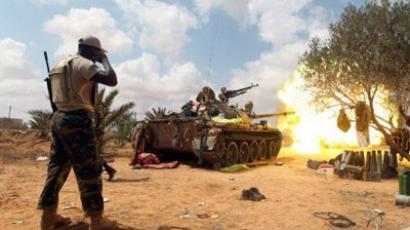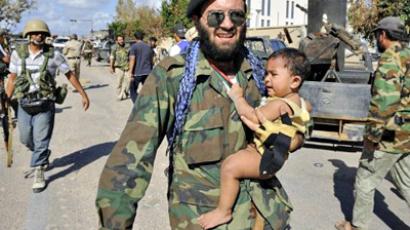NATO turns blind eye to Libyan collateral damage – Human Rights Watch
NATO killed 72 civilians “in air attacks on unclear targets” during its 2011 Libyan campaign, Human Rights Watch reports. The group slammed NATO for downplaying the extent of civilian deaths inflicted during its drive to topple the Gaddafi government.
The report, “Unacknowledged Deaths: Civilian Casualties in NATO’s Air Campaign in Libya," provides a detailed examination of eight NATO air strike sites. Extensive field investigations determined no “Libyan military forces, weapons, hardware, or communications equipment had been present at the time of the attack” at seven of the sites, the report said.The group further charges that under the “laws of war,” member states are “obligated to investigate allegations of serious violations and compensate victims of unlawful attacks."Of the 72 civilian deaths, 20 were women and 24 were children.“Attacks are allowed only on military targets, and serious questions remain in some incidents about what exactly NATO forces were striking,” Fred Abrahams, the principle author of the report, said.But NATO spokeswoman Oana Lungescu shot back Monday, saying the Western alliance "did everything possible to minimize risks to civilians" during the 2011 Libyan conflict. She further claimed that after looking into every credible allegation of civilian casualties, the alliance had confirmed that “the specific targets struck by NATO were legitimate military targets.”Her comments echo those made by NATO chief Anders Fogh Rasmussen in the wake of the campaign last year. Wenzel Michalski of Human Right Watch told RT that NATO really “used precise smart guns and smart weapons that would target, really, only military sites.”However, in“seven out of eight sites, we found that this was not the case. And we don’t understand why NATO is not doing any investigation. It should be. It’s obliged to do that,” he continuedAs “the guns also have cameras” and “the pilots have infrared cameras,” Michakski concludes that NATO “should have seen that there was no military on the sites.”The report’s author Fred Abrahams believes that “the overall care NATO took in the campaign is undermined by its refusal to examine the dozens of civilian deaths.”The 76-page report is the most extensive examination ever conducted into civilian casualties caused by NATO air strikes in Libya.This past March, an Amnesty International investigation concluded that NATO had taken “insufficient precautions…in attacks that targeted possible combatants staying at civilian homes.”The Amnesty report cited 55 civilians, including women and children, who were killed in Tripoli, Zlitan, Majer, Sirte and Brega. It cited no evidence indicating thatr any of the targeted properties had been used for military purposes.
‘NATO operates like a military dictatorship’
No longer can killings by aerial bombing be regarded as mistakes, states Vijay Prashad, director of International Studies at Trinity College in the US. “We know they are going to happen and yet we persist in creating war through aerial bombardments.”
“It’s not unavoidable; you’ve made a choice to kill civilians by conducting warfare from the sky,” he told RT.
NATO says it can evaluate the civilian deaths if the Libyan government calls for it. But the current rulers in Tripoli are beholden to the alliance, and therefore are not willing to ask for any investigation, Prashad says.
“NATO is operating basically like a military dictatorship,” he claims, arguing that there is no civilian control over the alliance's actions.














